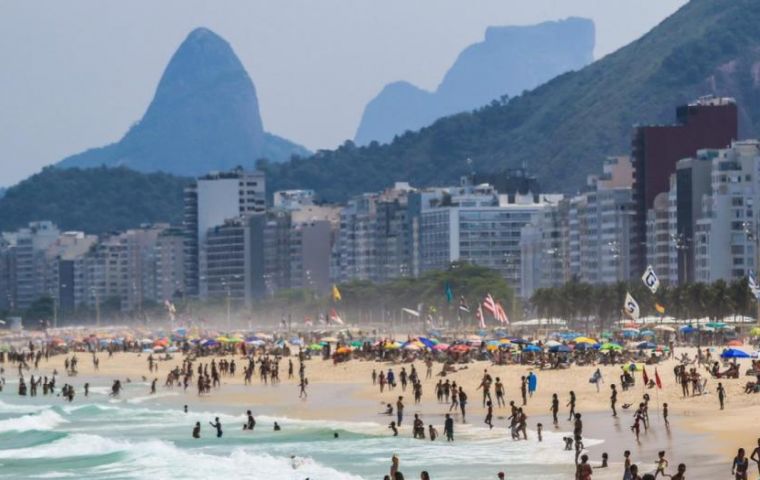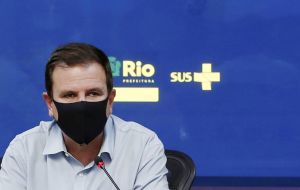MercoPress. South Atlantic News Agency
Rio beaches closed for the weekend and no tourists allowed into the city
 COVID-19 is raging in Brazil, where intensive care units are more than 80% full in 25 out of 27 states. In Rio, the rate is 95%.
COVID-19 is raging in Brazil, where intensive care units are more than 80% full in 25 out of 27 states. In Rio, the rate is 95%.  Rio Mayor Eduardo Paes said the situation in the iconic beach city was “very critical,” and urged residents to stay home to slow the spread of the virus
Rio Mayor Eduardo Paes said the situation in the iconic beach city was “very critical,” and urged residents to stay home to slow the spread of the virus Rio de Janeiro closed its famed beaches on Friday in a bid to contain a surge of COVID-19, a move criticized by anti-lockdown President Jair Bolsonaro, who said sun-deprived citizens risked a lack of vitamin D.
Rio Mayor Eduardo Paes said the situation in the iconic beach city was “very critical,” and urged residents to stay home to slow the spread of the virus. COVID-19 is raging in Brazil, where intensive care units are more than 80% full in 25 out of 27 states. In Rio, the rate is 95%.
Brazil registered its second-deadliest day of the pandemic Friday, with 2,815 deaths in 24 hours and a record 90,500 cases.
But Bolsonaro, who has railed against stay-at-home measures and face masks, continued his campaign to keep the economy fully open, criticizing Rio's beach closure on the grounds that it would deprive residents of needed sunshine.
“Vitamin D is a way to prevent the virus from seriously affecting you. And where do you get vitamin D? From the sun. Such hypocrisy,” said the far-right leader.
Rio also closed its beaches a year ago during the first wave of COVID-19, with limited results.
Legendary beaches such as Copacabana and Ipanema were often jam-packed on sunny days, with few police around to enforce the closure. The city had fully reopened its beaches again in November, just before the southern hemisphere summer.
Paes also banned bus arrivals in the city for the weekend, seeking to keep tourists from adding to the spread of the virus. He warned that more restrictive measures could be announced on Monday, after he meets with the expert committee advising him on the pandemic.
“I am calling on all 'Cariocas'” - the nickname for Rio residents - “now is the time to stay home,” Paes told a news conference.
The city of 6.7 million people had already ordered businesses to close at 9:00pm starting Mar 5.
Sao Paulo, Brazil's economic capital, meanwhile decided to move up a series of five holidays in hopes of keeping more people at home.
Brazil is struggling to deal with a new wave of COVID-19 cases that experts say is driven partly by the emergence of a new strain of the virus known as “P1” or the Brazil variant.




Top Comments
Disclaimer & comment rulesCommenting for this story is now closed.
If you have a Facebook account, become a fan and comment on our Facebook Page!